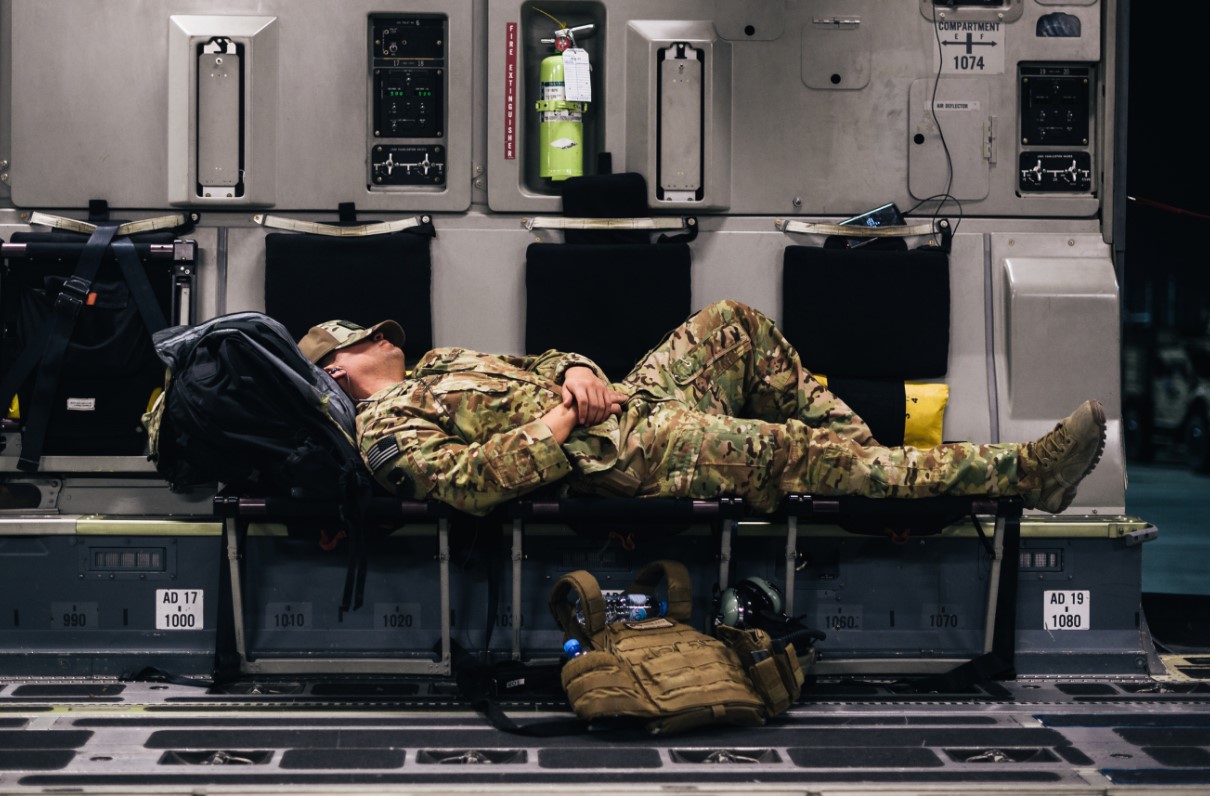Editor’s note: This article by Patricia Kime and Jim Absher originally appeared on Military.com, a leading source of news for the military and veteran community.
Active-duty service members suffer from sleep deprivation at a rate roughly double that of the civilian population, a shortfall that can contribute to mental health disorders and physical illness and affects readiness, according to a new Defense Department report to Congress.
While the finding that troops do not get enough sleep is not new, the report, mandated by the fiscal 2020 National Defense Authorization Act, notes that sufficient sleep is not valued by commanders across the services.
"Inadequate sleep appears to be more the rule than the exception," it adds.
"Across military commands, attitudes toward sleep may range from viewing sleep as a controlled ration to asserting that a need for sleep is a sign of weakness," according to the report, "Study on Effects of Sleep Deprivation on Readiness of Members of the Armed Forces."
[UPCOMING MOAA WEBINARS: MOAA.org/Events]
A lack of sleep can result in accidents; physical issues, including traumatic brain injury; mental health conditions; and poor performance, according to the report.
"Sleep may be the most important biological factor that determines service member health and combat readiness," it notes.
Congress ordered the DoD to examine any policies it had on sleep and the causes of sleep deprivation, other than operations tempo and training requirements, among active-duty troops.
The research found that, while some troops may suffer from insomnia, they commonly have "behaviorally induced insufficient sleep syndrome" -- a lack of sleep caused by working long hours; in shifts or in environments that are inhospitable to quality sleep; or lifestyle choices, such as watching television or playing video games late into the night.
Not surprisingly, sleep deprivation is most common in combat and deployment settings and in training cadres, according to the report.
Studies show that 86% of Army personnel in Afghanistan reported sleeping less than seven hours per night, while Air Force personnel reported an average total sleep time of 6.7 hours per night, with 15% reporting less than 4.5 hours per night. Another study of Navy personnel in Afghanistan showed an average total sleep time of 5.9 hours per night, with 67% reporting less than seven hours per night.
[MORE RESOURCES: MOAA's Transition and Career Center]
"These results are consistent with other studies of Army and Marine Corps personnel, which demonstrate that 50% of deployed service members report sleeping five hours or less per night," the report states.
Likewise, training settings "show significant rates of partial sleep deprivation, despite evidence that trainees perform better when they receive more sleep."
For example, at the U.S. Military Academy, cadets sleep less than 5 hours per night during the week and under 7 hours per night on weekends. Troops at basic training get an average five to six hours of sleep a night and often are awoken several times a night for training. And soldiers in Ranger School typically get just three hours of sleep a night.
"Although the belief exists that short-term sleep deprivation during training is necessary to prepare service members for combat environments that might require conducting operations with little sleep, sustained chronic partial sleep deprivation may become counterproductive to overall training objectives," the report states.
Coffee, energy drinks and medications can be useful for counterbalancing fatigue, but they also can contribute to sleep deprivation or degradation, especially when consumed within six hours of a sleep window, it adds.
The report, compiled by Acting Assistant Secretary of Defense for Manpower and Reserve Affairs Virginia Penrod, recommended that the DoD take steps to combat sleep deprivation in the ranks, including creating policies to safeguard sleep.
[MORE CURRENTLY SERVING NEWS: Yes, There Is a 'Pink Tax' on Women's Military Uniforms, Report Finds]
The recommendations included:
- Allowing time for "tactical naps" of 20 minutes followed with a jolt of caffeine when periods of sleep deprivation are required due to operational necessity
- Allowing time for sleep banking (sleeping extra hours before a planned exercise) to allow members to perform at peak physical and mental capability when needed
- Directing leadership to a duty schedule that allows eight hours of sleep for those under their command
- Giving service members a location that is quiet and promotes restful sleep whenever possible
- Recognizing that caffeine use does not make up for sleep deprivation
- Giving aircrews extra time off to adjust their internal clocks after traveling across multiple time zones
- Training health professionals to recognize the symptoms of sleep deprivation and allow them to intervene when members exhibit symptoms of lack of sleep
- Providing military members with mobile applications that allow them to personally review and manage their sleep time
In 2017, the Navy suffered two fatal ship collisions that killed 17 sailors. While investigations determined that the incidents were due to human error, sleep deprivation was cited as a concern in both accidents. The service subsequently instituted new guidelines for rest for surface ship crews, guidance that was updated late last year and directed commanders to establish watch rotations that implement a natural sleep-awake concept.
Additional findings reported in the DoD study to Congress include:
- Nearly 76% of military members report getting less than seven hours of sleep per night, compared with 38% of civilians.
- Air Force members report the highest average nightly sleep time; the Army reports the least.
- Service members with duty-related sleep deprivation are far more likely to experience a motor vehicle accident or work-related injury.
- Samples from Army Rangers demonstrated a significant reduction in testosterone, considered critical for muscle recovery following physical activity, after military exercises requiring sleep loss.
Stay Informed
It’s more important than ever to make sure you’re in the know and your military benefits are protected.
